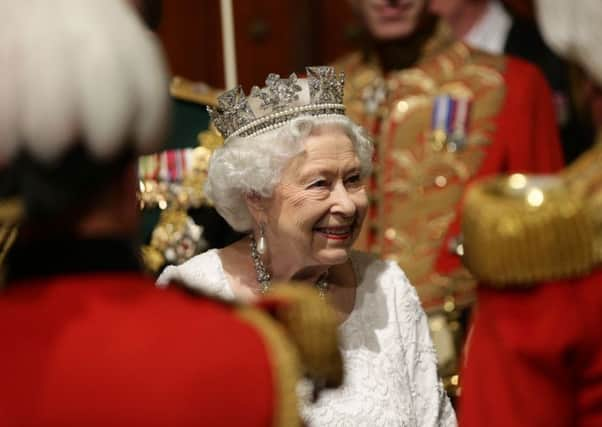Queen sets out Government's agenda in speech


The annual Queen’s speech set out a range of measures to modernise the UK’s economy, including legislation to enable the development of commercial spaceports, allow Britain to pioneer driverless cars and spread the use of drones by businesses and individuals, as well as a legal right to fast broadband connections for every household.
Prime Minister David Cameron described the package as a “one nation Queen’s speech from a progressive, one nation, Conservative government”, using the opportunities presented by Britain’s strengthening economy to increase life chances for the most disadvantaged.
Advertisement
Hide AdAdvertisement
Hide AdThe speech, delivered by the Queen amid the traditional lavish ceremony of the State Opening of Parliament in the Palace of Westminster, would usually be a central focus of the political calendar.
But this year it provides a brief respite from the battle over Britain’s EU membership, and its relatively modest contents reflect the extent to which the Prime Minister’s political energy is concentrated on the referendum on June 23.
With intense scrutiny on the struggle which is dominating Westminster and setting Conservatives against one another, the Queen made only the briefest of direct references to her Government holding “a referendum on membership of the European Union”.
But - in what may be seen as an attempt by Mr Cameron to signal that remaining in the EU does not mean giving up the UK’s independence - she added: “My ministers will uphold the sovereignty of Parliament and the primacy of the House of Commons.”
A roster of 21 new bills sets out plans to give prison governors new powers to control their own jails, as well as an overhaul of education and rehabilitation programmes which ministers described as the “biggest reform of our prisons since Victorian times”.
A Higher Education and Research Bill will make it easier to open new universities, and the academy schools programme will be expanded by an Education for All Bill - though not extended to every school in England as Mr Cameron initially planned.
Court guidelines will be altered by a Children and Social Work Bill in favour of permanent adoptions, and children in care will be given a new “covenant” setting out local authorities’ duties to help them with housing, jobs and healthcare after they leave care.
A raft of measures in a Counter-Extremism and Safeguarding Bill is designed to crack down on extremism, including stronger powers to disrupt radicals’ activities and to intervene in unregulated schools which are “teaching hate”. Ministers will consult on a new civil order regime to restrict extremist activity.
Advertisement
Hide AdAdvertisement
Hide AdAs expected, the speech set out plans for a British Bill of Rights to replace the Human Rights Act and included legislation to establish the Help to Save scheme and Lifetime ISA to encourage saving.
It also confirmed the Government’s intention to renew the UK’s Trident nuclear deterrent system, though ministers gave no clue on whether a vote on new submarines - which could potentially split Labour - will take place during the coming year, stating only that one can be expected before the next general election.
Measures to boost the economy included an Infrastructure Bill to speed the planning process and a Local Growth and Jobs Bill to allow councils to keep and invest all the business rates they raise. A Digital Economy Bill will make it easier and cheaper for telecommunications providers to establish faster broadband and more comprehensive mobile networks.
In a statement released as the Queen delivered her address to MPs and peers in the House of Lords, Mr Cameron said: “This is a One Nation Queen’s Speech from a One Nation Government. It sets out a clear programme of reform, using the strength of our economy to deliver security for working people, increase life chances for the most disadvantaged and strengthen our national security.”
